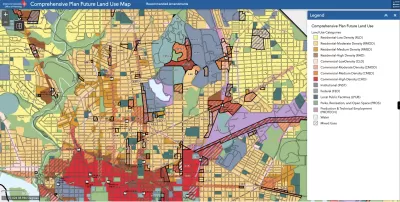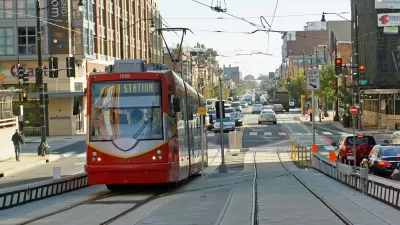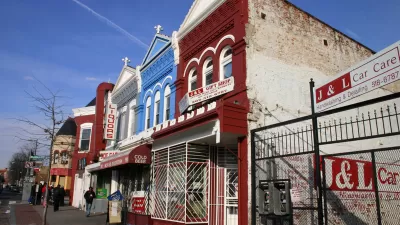The new D.C. Office of Equity has produced an evaluation of proposed changes to the D.C. Comprehensive Plan.

[Updated April 22, 2021]
"As the D.C. Council prepares to debate and propose amendments to the city’s Comprehensive Plan, a new analysis from the Council’s Office of Racial Equity has issued a withering assessment of the plan’s impact on racial equity," reports Ally Schweitzer.
Schwietzer puts the report in context of the political and planning process for the Comprehensive Plan update:
The analysis is expected to be the subject of intense discussion [April 20], as lawmakers convene to work on proposed changes to the roughly 1,500-page land-use document, which guides development and growth in the city over a 20-year period. The markup is the latest phase in a five-year-long amendment process watched closely by low-income housing advocates, real estate developers and supporters of “smart growth” policies.
The controversial issues in question include how much to incentivize new housing development as an affordable housing tool and whether the plan does enough to prevent gentrification and displacement. Mayor Muriel Bowser wants the update to make it remove some exclusionary zoning restrictions. Recent amendments proposed by Council Chairman Phil Mendelson "added numerous references to racial segregation, racial equity and prioritizing housing affordability," according to Schweitzer.
“The Comprehensive Plan, as introduced, fails to address racism, an ongoing public health crisis in the District,” the report says. “It appears that racial equity was neither a guiding principle in the preparation of the Comprehensive Plan, nor was it an explicit goal for the Plan’s policies, actions, implementation guidance, or evaluation. These process failures laid the groundwork for deficiencies in policy: proposals are ahistorical, solutions are not proportionate to racial inequities, and directives are concerningly weak or vague.”
The Office of Racial Equity was established in January 2021, with the purpose of independently assessing legislation for consequences relevant to racial equity. D.C. Mayor Muriel Bowser appointed Amber Hewitt to lead this office as Chief Equity Office earlier in April.
[Update: Michael Brice-Saddler and Julie Zauzmer report the latest development in the approval process for the proposed amendments to the D.C. Comprehensive Plan: "The D.C. Council on Tuesday advanced amendments to the massive blueprint that will shape city development in coming years, though several lawmakers voiced concerns that the changes do not adequately address systemic racial and socioeconomic inequities." Also, "Tuesday’s vote was the first step in a legislative process that will unfold over the next several weeks to amend the Comprehensive Plan, which is rewritten every 20 years and spells out the District government’s rules for land use in every neighborhood of the city."]
FULL STORY: Bowser’s Changes To D.C.’s Comprehensive Plan Will ‘Exacerbate Racial Inequities,’ Analysis Says

Trump Administration Could Effectively End Housing Voucher Program
Federal officials are eyeing major cuts to the Section 8 program that helps millions of low-income households pay rent.

Planetizen Federal Action Tracker
A weekly monitor of how Trump’s orders and actions are impacting planners and planning in America.

Ken Jennings Launches Transit Web Series
The Jeopardy champ wants you to ride public transit.

Rebuilding Smarter: How LA County Is Guiding Fire-Ravaged Communities Toward Resilience
Los Angeles County is leading a coordinated effort to help fire-impacted communities rebuild with resilience by providing recovery resources, promoting fire-wise design, and aligning reconstruction with broader sustainability and climate goals.

When Borders Blur: Regional Collaboration in Action
As regional challenges outgrow city boundaries, “When Borders Blur” explores how cross-jurisdictional collaboration can drive smarter, more resilient urban planning, sharing real-world lessons from thriving partnerships across North America.

Philadelphia Is Expanding its Network of Roundabouts
Roundabouts are widely shown to decrease traffic speed, reduce congestion, and improve efficiency.
Urban Design for Planners 1: Software Tools
This six-course series explores essential urban design concepts using open source software and equips planners with the tools they need to participate fully in the urban design process.
Planning for Universal Design
Learn the tools for implementing Universal Design in planning regulations.
Ada County Highway District
Clanton & Associates, Inc.
Jessamine County Fiscal Court
Institute for Housing and Urban Development Studies (IHS)
City of Grandview
Harvard GSD Executive Education
Toledo-Lucas County Plan Commissions
Salt Lake City
NYU Wagner Graduate School of Public Service





























